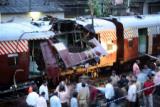TIMES, THEY ARE A CHANGING...
“…Slow one now will later be fast,
As the present now will later be past,
The order is rapidly fading…
And the first one now will later be last,
As the times they are a changing.”
- Bob Dylan.
In the ever changing milieu, the TOI has become a constant in the lives of millions in
The newspaper today sells 2.6 million copies daily, and has an average issue readership in excess of 7 million, which makes it by far the world's largest English-language broadsheet newspaper. Its success can be warranted to aggressive marketing strategies and a loyal readership. The role of TOI in shaping the opinion of urban readers is undeniable.
It has continued to evolve with time adding colour and regional flavour to its content. The broad-sheet was trimmed significantly which made it more convenient to read and also its format is easier to follow for the discerning reader. The Mumbai Mirror was launched on
Also the various supplements offered along with the main sheet, makes it an ideal family read, which offers something to everyone. Its ability to adapt and internalize the local essence in its content imparts a unique relatable character which easily percolates into the daily consciousness of a reader. To garner support for social concerns, from all quarters, has been its forte and is indeed commendable.
The TOI has come under sharp criticism for its bullish tactics in order to sustain its complete monopoly on the advertising market. Its controversial Medianet division which places “advertorials” at a fee, with a legal rate card available at its office, has been widely condemned, leading to a raging debate in media ethics. Also, its language has drawn considerable flak from purists who find it crass and sub-standard, with obvious glaring mistakes in grammar and editing.
Its strategy of flooding the market with 100 pages daily before DNA and Hindustan Times entered the Mumbai market to captivate attention, is hardly the hallmark of a leader secure in its competence. The tendency to ascribe to a popular opinion is reflected in its emphasis and placement of such articles. Recent controversies such as the suppression of independent media by serving legal notice for libel, case in point being the “Mediaah” weblog writer Pradyuman Maheshwari, a noted media critic, has mired its reputation. Sensationalism seems to have crept in with an undue focus on frivolous issues. Its pro-establishment stance strongly undermines the validity of alternative opinions, deflecting from the tradition of dialectics expected from a national newspaper.
The lines between news and entertainment have blurred in the publication which must be restored to maintain structural integrity of the paper. Also, it is the leader that protects the readers, so it is important that it does not indulge in self-promotion of sister brands. The readers buy a newspaper for its news content so it is necessary that it adheres to the code of free and fair journalism. It must prove it befits the title of being the leader not in marketing and sales but in the quality of their editorials and content. The TOI has a long standing tradition of producing world class journalists which must not be compromised.
Even with its credibility questioned and embroiled in controversy, TOI still remains a staple for many, proven by its iconic popularity. The future of media may be “Me media”, which caters to an individual predilection, but the strength of a newspaper, the daily amalgam of cacophony of life, lies in its ability to consider all viewpoints and deliver a just opinion. Let truth prevail.
An interesting and informative analysis of the Mediaah weblog incident by Mark Glaser for the Online Journalism review who aptly recognises the necessity of protecting independant media may be read at the following link.









